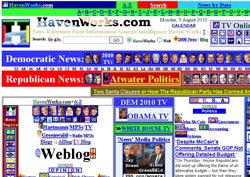As a growing majority people look to their mobile devices to seek information, parks and recreation agencies are becoming more reliant on websites and applications to reach their members.

As a growing majority people look to their mobile devices to seek information, parks and recreation agencies are becoming more reliant on websites and applications to reach their members. It's no longer a matter of IF your agency needs a website (you absolutely do) but how your website stacks up to the competition. And if there's one thing parks and recreation departments aren't known for, it's their trend-setting tech savvy. That's okay - no one is expecting them to be. What people are expecting is to be able to visit a website and find the information they need as quickly and easily as possible.
So how many clicks does it take site visitors to find what they're looking for? How accessible is facility information, program information or sign-up pages?
"One of the things that really troubles me is how complex these agencies have made their programs," says Choton Basu, professor of information technology at the University of Wisconsin-Whitewater and director of the university's Global Business Resource Center, referring to the registration process that brings many users to an agency's site. "They don't understand from a consumer standpoint, to be faced with an onslaught on a website - to have to check so many boxes just to tell you who they are - people lose interest and leave."
How many times does a visitor have to click to find and then sign up for an activity? Each click represents an opportunity for a visitor to lose interest and quit the process, especially if they're not sure that they're on the right path to the information they're looking for to begin with. Page headings need to be simple and straightforward, as does the rest of the information on the site.
"A lot of agencies think they're being humorous or clever when they come up with descriptions," says Basu. "For example, they'll list the age for an event as "Birth and up." So it's open to everybody? They say, 'Yeah, but birth and up is more fun.' We get that, but if someone is searching for events open to everybody, 'Birth and up' isn't going to show up. You don't want to miss out on that because you didn't present your events correctly."
MOBILE IMPAIRMENT
The other big factor in visitor experience is, of course, what kind of device they are using to view a web page. "We run analytics on our parks' general web traffic," says Greg Nasto, president of Mousetrap Mobile, which has partnered with the Michigan Recreation and Parks Association to bring its text messaging system and SMART Parks and Recreation app to any community in Michigan that wants it. "The smallest we've seen is about 30 percent of all traffic from mobile. Typically we see 40 or 50 percent. I read recently that 44 percent of people who go to a website that is not built for mobile will opt out and not return."
Responsive web design has been growing in response to the need for more mobile-friendly websites. Under this type of web design, a website recognizes what type of device it is being viewed upon and reorders and resizes page elements accordingly. The alternative is to create a mobile version of a website - a completely different site incorporating the same information but designed specifically for a smartphone.
An optimized website not only improves the user experience, it facilitates communication between all platforms. Many organizations are investing in mobile applications, but those are often tied back to the content of a traditional website. "In a perfect world, we're able to tap into their existing website," says Nasto of the SMART apps his company creates for communities. Ideally, one update to an agency's website will also update other platforms. But it's not often that easy, he says. "Ninety percent aren't mobile. We look at it and see how we're going to convert it to mobile and ask them what they want and build it."
While less expensive than a complete overhaul of an existing website, mobile versions offer less flexibility, and, as it essentially creates two separate websites, will end up costing more time and resources in the long run.
"If you want to really engage your community, you need to simplify things," says Basu. "Focus your time on coming up with unique programs. You run the parks, the trails, you maintain all of that. You can run extremely cool programs. If you can engage your community, if you have a community that knows what's going on, then the parks and recreation programs will flourish."
>>Check out the August issue of Athletic Business for more on developing a mobile applications.





































